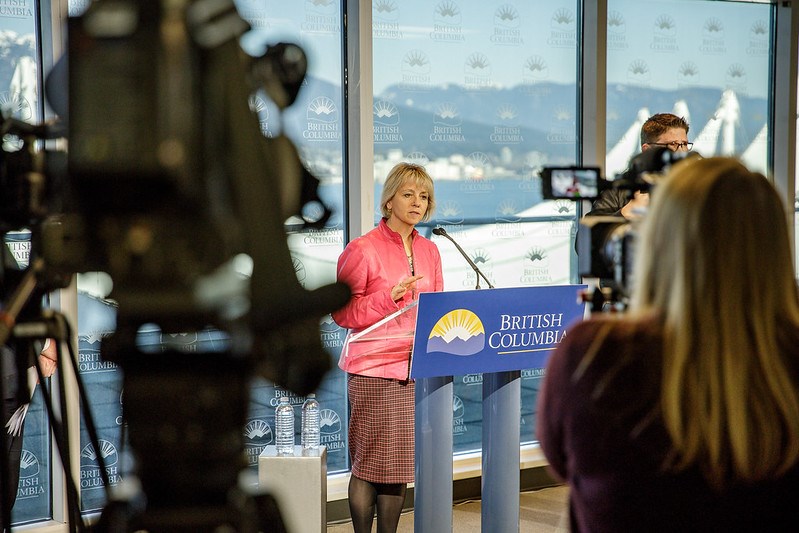B.C. Supreme Court Justice Simon Coval has sided with provincial health officer Dr. Bonnie Henry on vaccine mandates for health-care workers, largely dismissing claims they are unreasonable and unconstitutional.
In a May 10 ruling, Coval states that the province’s top doctor was justified in extending COVID-19 vaccine mandates from October 2021 via two renewed orders made on Oct. 5, 2023.
The petitioners, who are health-care workers who had lost their jobs for refusing to be vaccinated, lodged a claim on four key grounds, Coval summarized in a lengthy written decision.
On the claim that COVID-19 was no longer “an immediate and significant risk” to public health in B.C., Coval determined “transmission of the virus continued to pose an immediate and significant risk to public health throughout the province, justifying the ongoing use of the emergency powers.”
On the claim that unvaccinated health-care workers posed no greater risk to vulnerable patients, or the health-care system generally, than vaccinated workers, Coval sided with Henry’s evidence that a fully vaccinated workforce mitigated transmission risks.
Coval noted that he was not assessing the veracity of the scientific evidence but rather whether the evidence supported Henry’s claims. As such, since the vaccine has been proven to reduce transmission and rates of hospitalization, the mandate was generally justified.
Some of the petitioners also claimed the mandate impeded on their constitutional rights of freedom of religion.
And indeed, the mandates did so, Coval ruled; however, they did so within reason “to achieve the essential public health objectives of protecting vulnerable patients, residents and clients from serious illness and death, and safeguarding the functioning of the province’s health-care system.”
Coval quickly tossed away the claims the mandate violated personal beliefs on vaccination and prevented some workers from keeping their jobs in their chosen professions.
“The orders did not compel them to accept unwanted medical treatment, and so did not interfere with their bodily integrity or medical self-determination,” stated Coval.
The Charter of Rights “protects neither the right to work in any specific employment or particular profession, nor the right to avoid the stress and hardship of being denied employment in a profession due to non-compliance with its governing rules and regulations,” added Coval.
There was one caveat to Coval’s otherwise consistent rebuke of the petitioners. Coval instructed Henry to reconsider whether to permit requests from health-care workers to remain unvaccinated if they are able to “perform their roles remotely, or in-person but without contact with patients, residents, clients, or the frontline healthcare workers who care for them.”
Of the 11 original petitioners, Coval noted “many” worked remotely and without contact with patients or frontline staff.
Coval considered three petitions altogether.
Peternella Hoogerbrug was a nurse practitioner, previously employed in an urgent care centre within the Fraser Health Authority but terminated in May 2022. Hoogerbrug led a second petition on religious grounds.
Dr. York Hsiang, a surgeon from Vancouver General Hospital; Dr. David Morgan, a psychiatrist from Prince George Youth Forensic Clinic; and Hilary Vandergugten, a registered nurse who was the clinical coordinator at Langley Memorial Hospital made up a third petition when they refused vaccination based on their personal convictions and risk-benefit analyses, according to Coval’s ruling.
Most petitioners reported being unemployed or underemployed, Coval noted, adding approximately 1,800 health-care workers had lost their jobs due to opposition to the mandate.
Hsiang “chose to retire in November 2021, at the age of 67, rather than face termination of his consultation and teaching roles,” the judgment noted. Morgan was terminated but has maintained a full-time private psychiatry practice and role as a clinical assistant professor in UBC’s faculty of forensic psychiatry. Vandergugten was also terminated and went on to part-time work conducting COVID-19 testing in the film industry.
“Nearly all viewed vaccination as a personal health decision that should be a matter of choice,” noted Coval, and “most who refused on religious grounds referred to the conflict between their Christian beliefs and the use of fetal cells in the vaccines’ development.”

